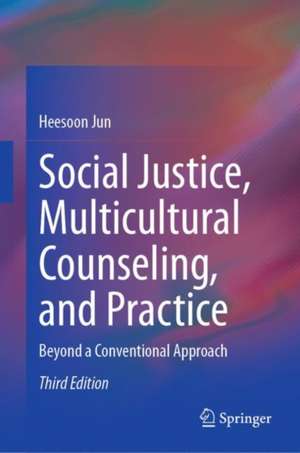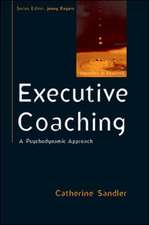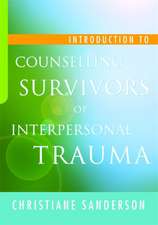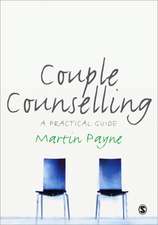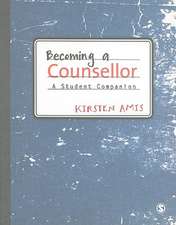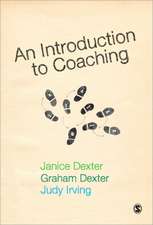Social Justice, Multicultural Counseling, and Practice: Beyond a Conventional Approach
Autor Heesoon Junen Limba Engleză Hardback – 13 mar 2024
This book is for everyone who wants to implement diversity, equity, and inclusion measures by learning to access their unconscious bias. Understanding social justice and equity and good intentions alone do not lead to accessing unconscious bias.
| Toate formatele și edițiile | Preț | Express |
|---|---|---|
| Paperback (1) | 926.44 lei 43-57 zile | |
| SAGE Publications – 31 aug 2009 | 926.44 lei 43-57 zile | |
| Hardback (2) | 960.13 lei 43-57 zile | |
| Springer Nature Switzerland – 13 mar 2024 | 960.13 lei 43-57 zile | |
| SAGE Publications – 31 aug 2009 | 1279.85 lei 43-57 zile |
Preț: 960.13 lei
Preț vechi: 1170.89 lei
-18% Nou
Puncte Express: 1440
Preț estimativ în valută:
183.78€ • 199.69$ • 154.47£
183.78€ • 199.69$ • 154.47£
Carte tipărită la comandă
Livrare economică 21 aprilie-05 mai
Preluare comenzi: 021 569.72.76
Specificații
ISBN-13: 9783031503603
ISBN-10: 3031503600
Pagini: 473
Ilustrații: XIX, 473 p.
Dimensiuni: 155 x 235 mm
Greutate: 0.87 kg
Ediția:3rd ed. 2024
Editura: Springer Nature Switzerland
Colecția Springer
Locul publicării:Cham, Switzerland
ISBN-10: 3031503600
Pagini: 473
Ilustrații: XIX, 473 p.
Dimensiuni: 155 x 235 mm
Greutate: 0.87 kg
Ediția:3rd ed. 2024
Editura: Springer Nature Switzerland
Colecția Springer
Locul publicării:Cham, Switzerland
Cuprins
Chapter 1. Introduction: Finally Visible as a Whole Person through Intersectionality.- Part IA. Provider’s Awareness of Her Own Worldview.- Chapter 2. Intrapersonal Communication and Interpersonal Communication.- Chapter 3. Assessment of a Provider’s Values, Beliefs, and Biases.- Part IIA. Provider’s Awareness of Systemic and Internalized Oppression/Privilege.- Chapter 4. Racism.- Chapter 5. Sexism.- Chapter 6. Cissexism (Genderism or Binarism).- Chapter 7. Heterosexism.- Chapter 8. Classism.- Chapter 9. Disablism/Ableism.- Chapter 10. Other Isms Due to Age, Language, Religious Affiliation, and Region.- Chapter 11. Theory to Practice: Deconstructing Inappropriate Hierarchical, Dichotomous, and Linear Thinking Styles/Patterns.- Part IIIA. Provider’s Awareness of the Client’s Worldview.- Chapter 12. Identity Construction and Multiple Identities.- Chapter 13. Culturally Appropriate Assessment.- Chapter 14. Culturally Appropriate Treatment/Healing.
Notă biografică
Dr. Heesoon Jun was born in Seoul, South Korea and was socialized by a family which valued honor, commitment, religious and intellectual freedom but held implicit bias on race and class. She came to the US as a young adult to study psychology as an undergraduate. There, her sense of self shattered as her status changed from majority to minority, privileged to oppressed, and self-confident to self-doubting student. Dr. Jun’s bicultural and bilingual experiences, being an academician and practitioner, searching for balance between two world-views have been instrumental in emphasizing providers’ awareness of their own cultural values and biases in order to understand clients’ world views; paradigm shifts in thinking (from conventional to holistic); and learning (from conceptual to transformative) cognitive neuroscience and mindfulness practice in order to walk the walk of social justice and multicultural counseling competencies. Dr. Jun has a Master’s degree in clinical psychology from Radford University and a Ph.D. in educational psychology from the University of Washington. Currently, she resides in Washington State where she is a licensed psychologist with a part-time private practice and is a professor of psychology at Evergreen State College.
Textul de pe ultima copertă
This third edition book offers a paradigm shift in thinking (from binary to complex) and enables visibility for the intersectionality of multiple identities that range from privileged to oppressed. For example, real people’s heterogeneous racial identities within the same racial group are visible. A paradigm shift in learning (from conceptual to transformative) connects conceptual learning (cognition) to their experience (affect). “…. transformation does not simply emerge due to the individual’s awareness…. but is experienced” (Benetka & Joerchel, 2016, p. 22). Uncensored first-person (subjective) written responses to specific questions to access unconscious and implicit bias will connect the writer’s experience to conceptual learning of diversity, equity, and inclusion. Writing in third person (objective) interrupts the transformative aspect by bypassing the accessibility of inner experience. Writing in first-person connects the writer to their experience which allows the unconscious to be accessed if it is practiced on a regular basis.
This book is for everyone who wants to implement diversity, equity, and inclusion measures by learning to access their unconscious bias. Understanding social justice and equity and good intentions alone do not lead to accessing unconscious bias.
This book is for everyone who wants to implement diversity, equity, and inclusion measures by learning to access their unconscious bias. Understanding social justice and equity and good intentions alone do not lead to accessing unconscious bias.
Caracteristici
Uncensored first-person writing leads readers to be aware of their inner experiences (e.g., unconscious biases) Incorporate scientific inquiry with clinical inquiry for accurate assessment, diagnosis, and effective treatment Considers multiple perspectives from the client to care provider to implicit biases
Descriere
Descriere de la o altă ediție sau format:
A challenging book that will help students on counselling courses think about different approaches to race and diversity
A challenging book that will help students on counselling courses think about different approaches to race and diversity
